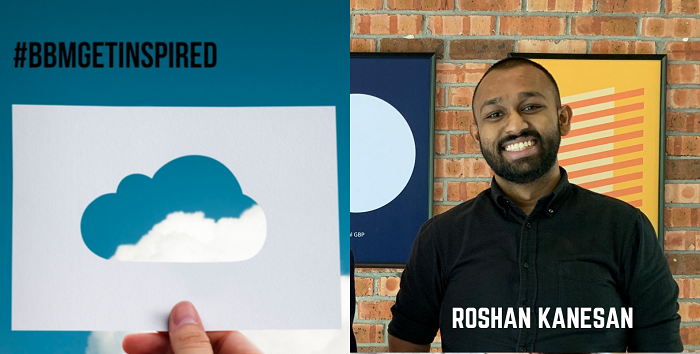Hello Grasshoppa,
It was my pleasure to be featured in the first episode of Ringgit & Sense for 2021 where we discussed money goal setting for 2021. I’ve been listening to Ringgit & Sense for the longest time and it was a pleasure being able to finally speak with Roshan. After the interview, I’ve actually approached Roshan to be part of #BBMGetInspired. In this segment, I will be interviewing personal finance & investment influencers to share their stories, tips & learning experiences. Hope you guys enjoy it.

1. Can you give our readers a short introduction about yourself?
My name is Roshan Kanesan, I’m currently a Radio Producer and Broadcaster at BFM 89.9, Malaysia’s premier business and current affairs station. This includes helming the weekly personal finance show, Ringgit & Sense; presenting and anchoring the daily show, The Morning Run; and interviewing industry leaders on BFM’s daily flagship show, The Breakfast Grille.
Outside of work, I dabble in my own content creation, primarily on Instagram and Twitter (and now Clubhouse as well). Most of it revolves around money, whether it’s personal finance or my take on business and markets.
2. As the host of Ringgit and Sense, what is the best investment or personal finance lesson that you have learned so far?
Have an emergency buffer fund and dollar-cost averaging.
It’s always exciting to talk about investing and assets, but what I’ve personally learnt from 2020 is the need to be prepared for the unexpected in order to help me sleep better at night. A year or so ago, things were very different and so were my priorities. We weren’t expecting rampant pay or job cuts, so while having a buffer fund wasn’t top of mind then, now it is. With some reprioritizing of existing assets, I’ve managed to reach 6 months of conservative expenses, but I’m aiming for 12. It’ll take me time, but for peace of mind, I feel it’ll be worth it.
As for investing, starting as early as you can is a given so you can tap into the power of compounding interest, but how do you do so with market valuations this high? One thing that I’ve learnt that helps me invest for long term goals with less anxiety is the dollar-cost averaging strategy. This helps me diversify my investing over time as opposed to concentrating all my capital at one single point. This has become even more accessible (and cheaper) thanks to the rise of digital investment platforms like StashAway or Wahed, that use ETFs and invest globally. That said, keep in mind that EPF is also a form of DCA with our monthly contributions.
Also, to ensure that I’m consistently investing to maintain my DCA plan, I’ve automated my investing so that I don’t miss a deposit or “accidentally” use up my regular investment amount.
3. What are your financial goals?
I’ve got 2 main financial goals right now – retirement and a healthcare fund. Other than that, I believe more in building good financial habits as opposed to specific goals. So, I’m regularly investing and saving, while keeping a rough track of my money cash flows.
Here’s a template of my spreadsheet, if you’d like to check it out: https://docs.google.com/spreadsheets/d/1JSDlUQnGAF-CcSLC9mKcp_pjOuFzircYqLIHsZlqHg4/edit?usp=sharing
4. Where do you learn about investing or financial planning?
People, podcasts, blogs, books, and Youtube.
- Books – Some of my favourites include Unshakeable by Tony Robbins, I Will Teach You To Be Rich by Ramit Sethi, and the Psychology of Money by Morgan Housel. There are definitely more, you can check out this link to see my other favourite books
- People – I’ve also learnt a lot from doing my show, Ringgit and Sense, and the people I’ve spoken to there, so definitely check it out and follow the podcast.
- On YouTube, I like this channel called New Money; for blogs, I like ofdollarsanddata.com as well as mr-stingy.com; and for podcasts (besides Ringgit and Sense, haha) I like listening to Motley Fool Money, although I don’t listen to it as much as I used to nowadays.
Basically, I’m always learning and checking out new courses (I only discovered New Money a few weeks back), but with whatever we’re learning, it’s important to always verify any information you get, and keep learning more over time.
5. Can you share a glimpse of your investment portfolio or what are you currently investing in?
My basic investment philosophy is to mainly utilise passive investing and to only buy stocks when I believe that a company is significantly undervalued.
Roughly, EPF represents 14% of my investment portfolio, US-listed stocks 30%, Malaysian stocks 24%, and Stashaway investments represent 31%. I no longer actively engage in buying individual stocks, and in fact, I plan to slowly reduce my active portfolio and move that money over to passive investing vehicles over time (not necessarily Stashaway, I’m also keen to explore local funds for more diversified local exposure).
The only reason my stock portfolio is a sizable part of my broader investments is because I bought companies like Facebook, Alphabet, Microsoft, and Berkshire Hathaway last year during the steep market correction. Otherwise, I would’ve eventually moved that capital over to passive investing vehicles over time.
6. Do you track your spending? If yes, how?
Yes. I’ve got an app I’ve been using since 2010 called Homebudget, although it’s got a few years of tracking missing because I stopped for a while. But more importantly, I use a dedicated spreadsheet that I created to track my cashflow.
7. What is your worst financial or investment decision you have ever made?
Buying GoPro stock. I lost 50-60% there, but I learnt a lot about my own limitations when it comes to investing, as well as the importance of diversification and having an investment plan to guide my actions.
8. How do you define success in your life?
Honestly, I’m not entirely sure. This is still something that I’m learning, and my definition has changed over time. I think I will continue to adapt as I grow, learn, and mature. That said though, at this time I define success in life as being able to do a job I enjoy, while also being able to take care of my health, dabble in personal content creation on the side, spend time with my loved ones, and continue to grow and learn. It’s cliché, but that’s what I’m trying to work towards.
9. Any advice to BBM readers on investment or financial planning?
Prioritise creating an emergency buffer fund. It made a huge difference to my general anxiety levels about job and income security, and also reduced the anxiety I had towards my investments because I’m not worried I’ll need to sell or liquidate anything to meet sudden short-term needs.
Also, be realistic about your financial goals and your daily needs. The last year’s been pretty tough – cut yourself some slack. We all have our own mountains to climb and we’ll do it at different paces. Take it a step at a time, benchmark yourself against realistic goals, and keep moving forward.
You can also check him out on :
Website: roshankanesan.com
Clubhouse – @roshankanesan
Facebook: Roshan Kanesan
Twitter: @roshankanesan
Instagram: @roshankanesan
LinkedIn: Roshan Kanesan

OSS!



